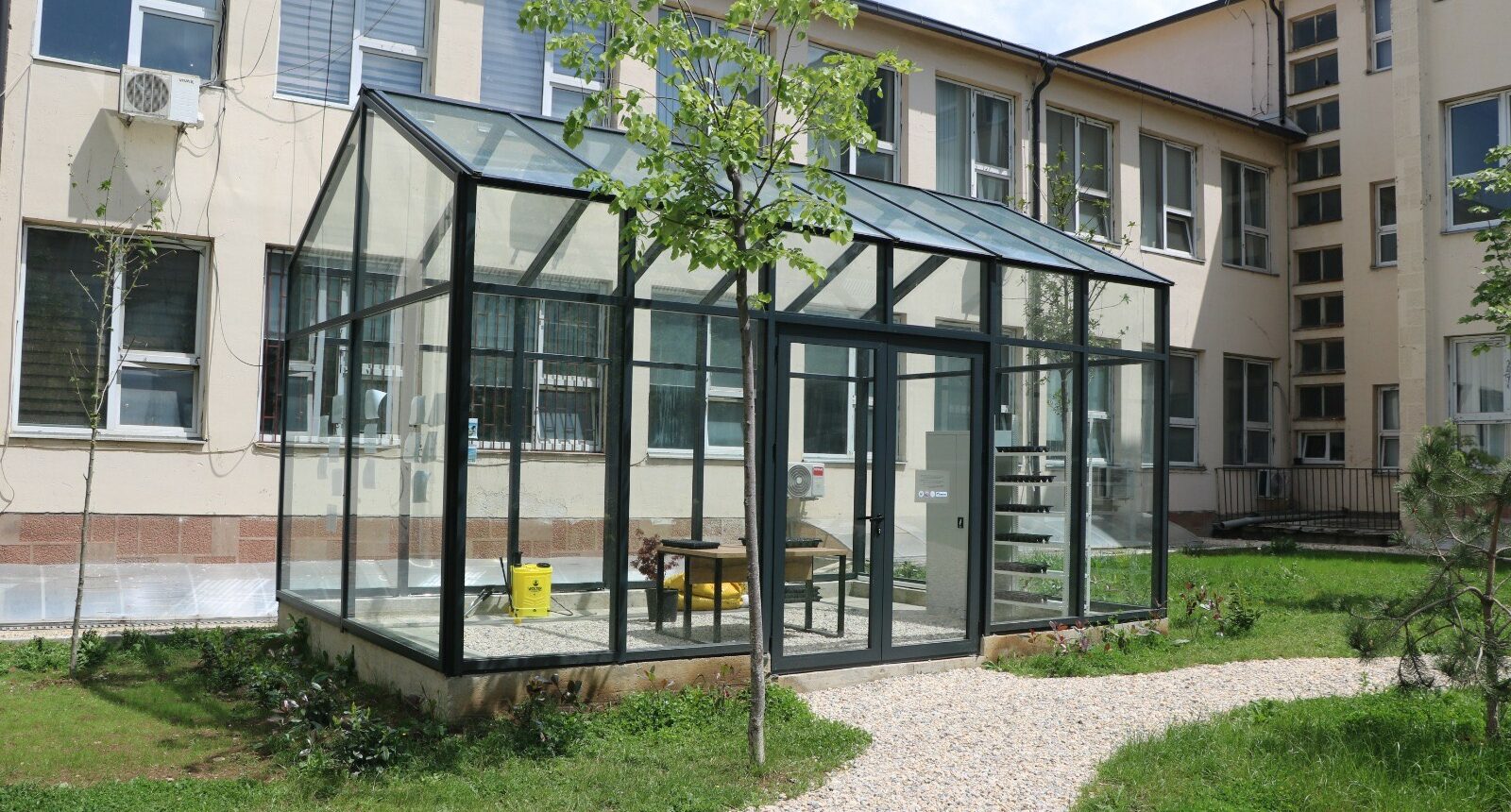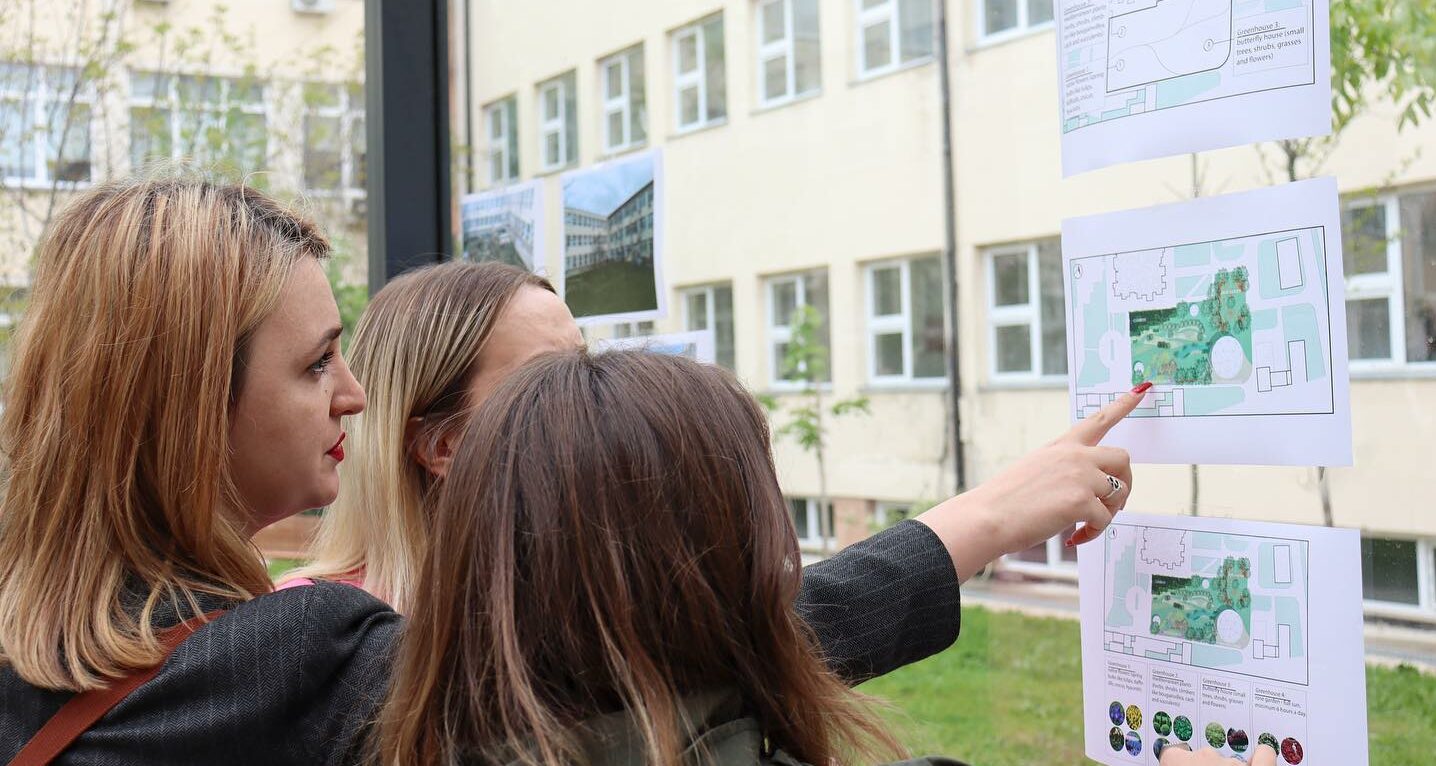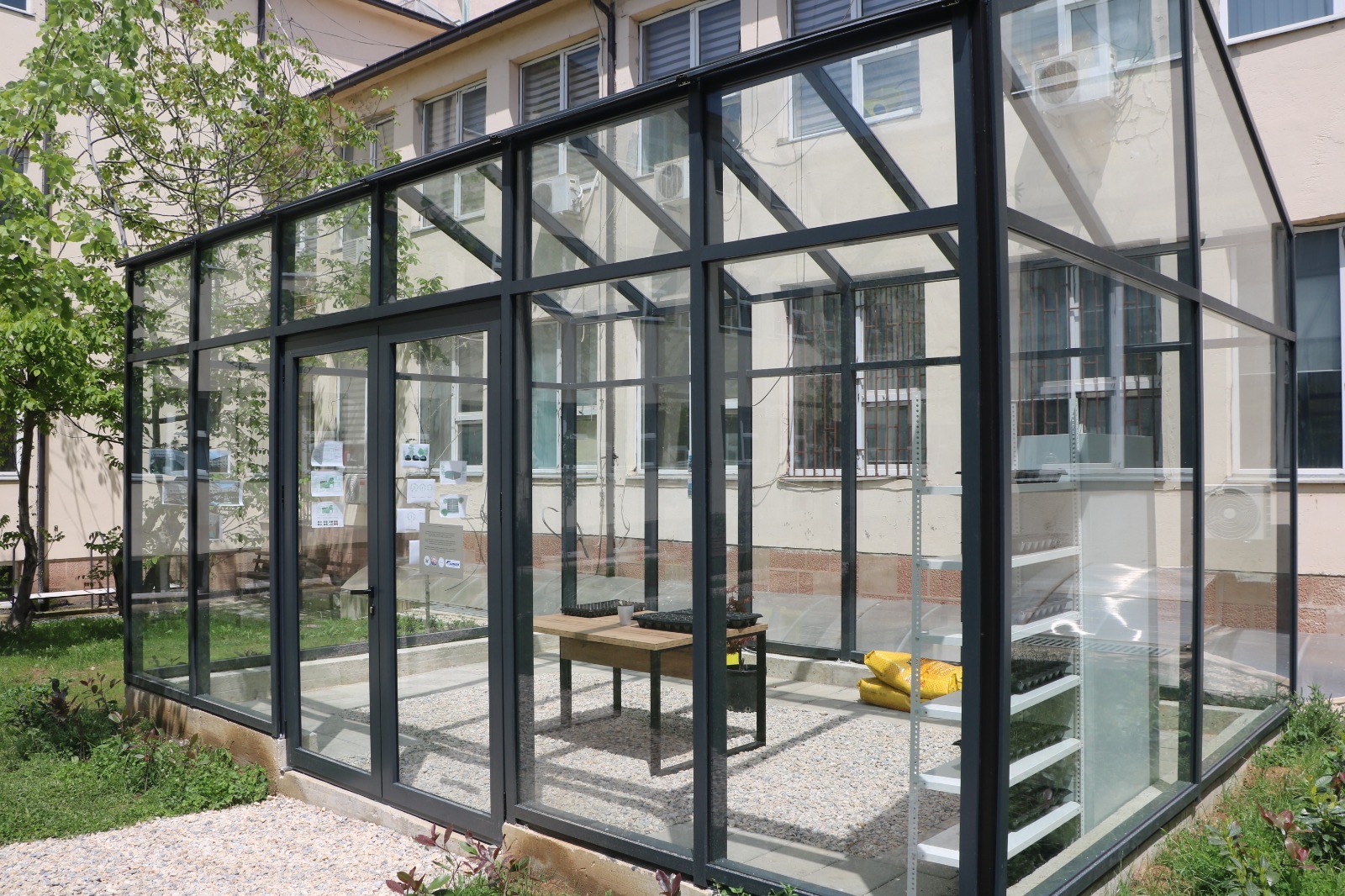In one of the University of Prishtina’s campuses, amidst a backdrop of old walls and dormant spaces, a remarkable transformation has taken root. But, it may take some time before the students get to see the first fruits.
In the heart of the University of Prishtina, nestled within the weathered walls of its faculties, a remarkable transformation has taken place. What was once an unused and forgotten space has blossomed into a vibrant botanical garden, brimming with life and promise.
Recognizing the absence of a botanical laboratory, Medina Orana, a lecturer at RIT Kosovo and Tringë Sokoli, a public policy specialist working in Government projects, took the initiative to establish a small community greenhouse that will be used as a botanical garden, within the inner courtyard of the Faculty of Philology and the Faculty of Mathematical-Natural Sciences.

Botanical Garden in the Campus of University of Prishtina. Photo: Eddie Rabeyrin/Prishtina Insight
This small oasis now nurtures the first seeds of aromatic and decorative plants, which will serve scientific purposes.
This small botanical garden will be used by students of biology, ecology, botany, and related fields , professors, and school students who will plant, cultivate, and grow different plants and use them for scientific studies and research. The space is also open to the public.
At a time when the world is facing rapid climate change that is causing the disappearance of rare and endemic plants, the benefits of botanical gardens play a vital role in preserving and cultivating them.
On May 11, the garden was inaugurated, financed by the US Embassy in Kosovo and administered by Kosovo United States Alumni, KUSA.
Idea took shape within the confines of a courtyard

Medina Orana and Tringë Sokoli. Photo courtesy of University of Prishtina.
Both Orana and Sokoli, as members of KUSA, have visited numerous countries out of their love for plants. They have also explored many botanical gardens, most of which are under the care of public universities.
“So the aspiration is to have a botanical garden in the future, and this greenhouse can serve as a starting point where plants can be cultivated and later exhibited there,”emphasizes Orana in an interview for Prishtina Insight.
According to her, focusing on endemic plants in the greenhouse promotes the preservation of local plant species. This, in turn, can raise students’ awareness about the importance of protecting native flora and its role in maintaining a healthy ecosystem.
“The greenhouse and the surrounding landscape can serve as a center for community engagement. Here, the general public can learn about native plants, participate in workshops, and engage in civic initiatives related to ecology,” she added.

Photo courtesy: KUSA
“Our journey has been like a rollercoaster ride. We faced many moments when we wanted to give up, but our determination to achieve the project’s goal kept us going. Whenever we faced a new challenge, we strategized and took the necessary actions to overcome it,” says Orana.
The change in management at UP led to a period of inactivity, causing delays, according to Orana. Additionally, disagreements arose regarding the optimal use of the internal garden, which had been functioning as a storage space, and the limited budget further exacerbated the situation. It was the assistance of other KUSA colleagues on a pro bono basis that ultimately brought the project to fruition.
The role of a Botanical Garden for students

Photo courtesy of University of Prishtina.
Biology students at the University of Prishtina currently have their classes in a basement with high humidity and little light, which did not allow them to grow different plants. The establishment of a botanical garden will provide them with a practical learning environment and bring them closer to plants.
Krenare Ibrahimi, a third-year Biology student, explains that they will focus on planting plants from the Rosaceae family in the garden. These plants are more familiar to them and easier to care for. She mentions that they already have the opportunity to observe plant processes up close, measure real parameters, and study related topics.
“From now on we will have the possibility to plant and grow them, allowing us to discuss the necessary humidity, temperature, pH, and many other factors,” she said for Prishtina Insight.
According to Biology and Ecology professor at the University of Prishtina and author of biology textbooks, Behxhet Mustafa, this small garden is crucial for students as it enables them to conduct experiments on physiological parameters such as transpiration, radiation density, light, temperature, humidity, and air quality.
Assistant Professor Bledar Pulaj, who specializes in Plant Ecology, Applied Ecology, Plant Ecophysiology, and Pharmaceutical Botany, believes that expanding the existing Botanical Garden and including plant species from different countries will generate national and international interest.
Pulaj emphasizes the importance of botanical gardens as a platform that connects theory and practice. They help preserve knowledge and skills related to plant studies, biodiversity conservation, and environmental protection.
Furthermore, Pulaj highlighted the value of botanical gardens for scientific research. They provide opportunities for students and scientists to study various plant species, including their morphology, root systems, structures, and responses to the environment, he explains.
“The botanical garden offers an excellent opportunity to educate the public about botany and the essential role of plants in our ecosystems,” Pulaj adds.
Importance of botanical gardens for research and conservation

Botanical Garden in the Campus of University of Prishtina. Photo: Eddie Rabeyrin.
Since 2000, Biology textbooks author Behxhet Mustafa has written over 50 articles emphasizing the need for botanical gardens in Kosovo.
Kosovo is the only country in the region without a botanical garden. These gardens are of special importance since they play a major role in researching, documenting, and conserving living plant collections.
Behxhet Mustafa, is delighted that two young women have fulfilled his long-standing desire.
With 40 years of experience as a biologist, Mustafa has been constantly advocating for the creation of botanical and zoological gardens in Kosovo. Due to the absence of local gardens, he had to include photographs of the botanical and zoological gardens from Skopje, North Macedonia, in the biology textbooks he authored.
“The greenhouse cannot be damaged here[because it is between the walls of the University], and the oasis is well-preserved with ample sunlight,” Mustafa explains.
He expresses his satisfaction with the progress made, stating, “They have done something remarkable with a symbolic amount of funds.”
“It’s late, but I hope that Kosovo will establish a National Botanical Garden. If construction begins this year, it will take 3-4 years, as it is no easy task. However, it is essential to start, and it will be taken seriously,” Mustafa concludes optimistically.





